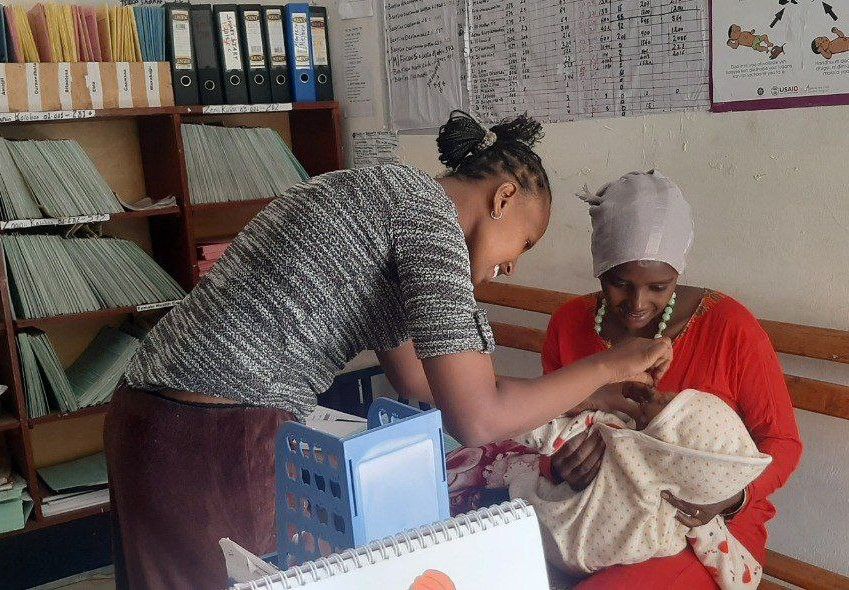Progress for 0 ad


Etenat Awol
Addis Ababa, Ethiopia

The 3rd National Social and Behavior Change (SBC) Summit, co-led by the Ministry of Health and the Ethiopian Health Education and Promotion Professionals Association (EHEPA), was held last week in Addis Ababa.
The summit, held under the theme “SBC for Sustainable Development”, brought together over 400 SBC professionals, government officials, academic institutions, development partners, and private sector players, to share experiences and discuss social and behavioral change.
Dr. Guda Alemayehu, Social and Behavior Change Lead at USAID and Chair of the SBC Summit event organizing committee, highlighted the selection of 80 innovative papers from over 200 submissions. According to Dr. Guda, the summit focused on healthcare, encompassing areas like reproductive health and healthy couple communication.
Ethiopia’s young population, with nearly 70% being youth, necessitates the development of digital tools tailored to their specific needs in the evolving digital world. “Digital health has become essential, regardless of personal preference,” says Dr. Guda. “Therefore, developing a framework that remains relevant in this landscape is crucial.” He emphasizes the importance of agility and flexibility in adapting solutions to resonate best with young people.
The summit showcased various innovative digital tools and frameworks, reflecting the critical need for SBC practitioners and institutions in Ethiopia to embrace the digital shift.
PSI Ethiopia, an organization that works towards improving public health through various programs and interventions, was among the participants who took part in the Summit. PSI highlighted its Smart Start, the digital counseling tool that replaced paper-based counseling. This shift prioritizes customization for youth and real-time impact measurement.
According to Limi Bedrudin, a program coordinator at PSI, the app is interactive and features video, audio, games, and quizzes, facilitating counseling by health extension workers and Smart Start Navigators.
It streamlines the process by eliminating the need for lengthy explanations, allowing for efficient counseling even in scattered rural households. Additionally, the tool provides a vast resource library for family planning and health information, empowering navigators without healthcare backgrounds to answer client questions confidently.
Launched in January 2023, the tool has reached three Ethiopian regions (SNNP, South-West Ethiopia, and Oromia), and the resources are made available in different languages, including Amharic, Oromiffa, and Sidama languages. During the scale-up, they were able to reach 48,192 new clients with the Smart Start digital counseling tool. Smart Start navigators receive training before providing counseling using the app.
Smart Start 2.0, informed by healthcare workers and client feedback through multiple prototype iterations, delivers a more engaging, informative, and user-friendly experience.
Pilot results show increased user satisfaction and a significant rise in method uptake (74% vs. 64%) compared to the manual version. Recognizing its success, the Ministry of Health has integrated Smart Start’s human-centered framework into its national program, aiming to reach one million girls by 2025 and empower rural couples in family planning decisions.

Another innovative digital tool showcased at the summit was Hulu Betena. This e-health mobile app empowers rural Ethiopian families by providing critical information and resources throughout the stages of pre-pregnancy, pregnancy, delivery, and early childhood.
Collectively owned by stakeholders and led by the Ministry of Health, Hulu Betena caters to both smartphones and basic phones, ensuring accessibility for all. With easy-to-use features, it empowers couples to actively participate in their family’s health and make informed decisions, leading to improved health outcomes and increased utilization of essential services.
U-Report Ethiopia, a confidential telegram bot for youth, also took the booth. This UNICEF-led initiative launched six months ago, enables young people to voice their opinions on critical issues.
With over 12,000 engaged users in its soft launch and a full launch on the horizon, U-Report provides a safe space for anonymous feedback, informing policy decisions and solutions impacting young Ethiopians.
Additionally, Girl Effect’s TEGA (Technology Enabled Girl Ambassadors) girl-operated digital research tool, which allows girls to collect real-time insights into the lives of their peers, was also among the digital tools highlighted in the Summit.